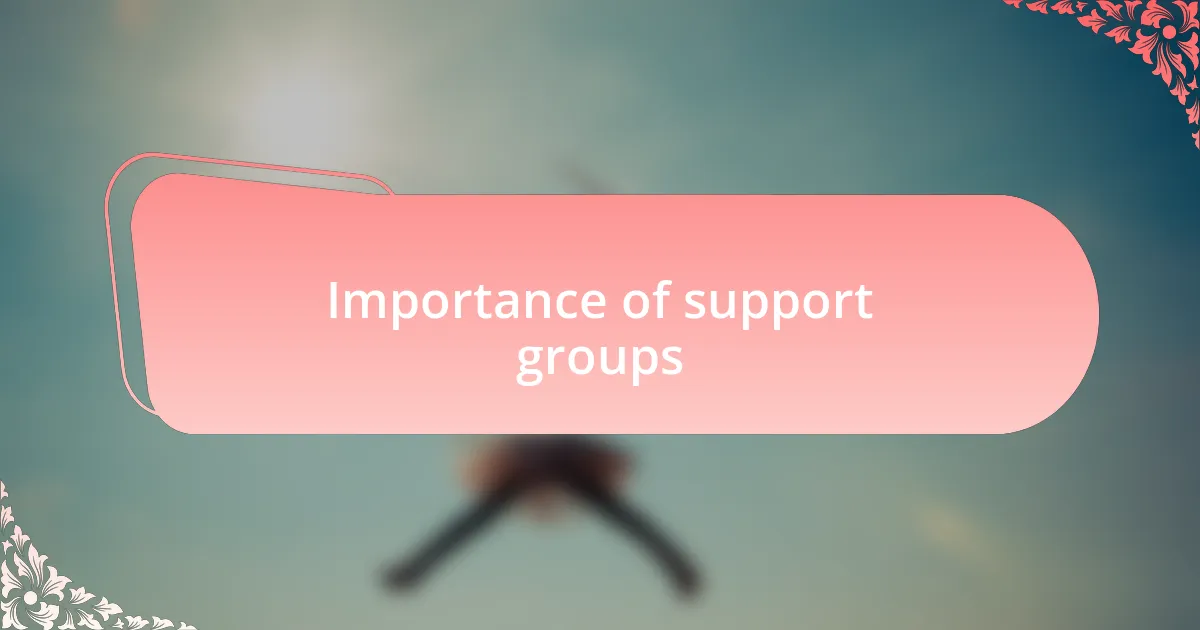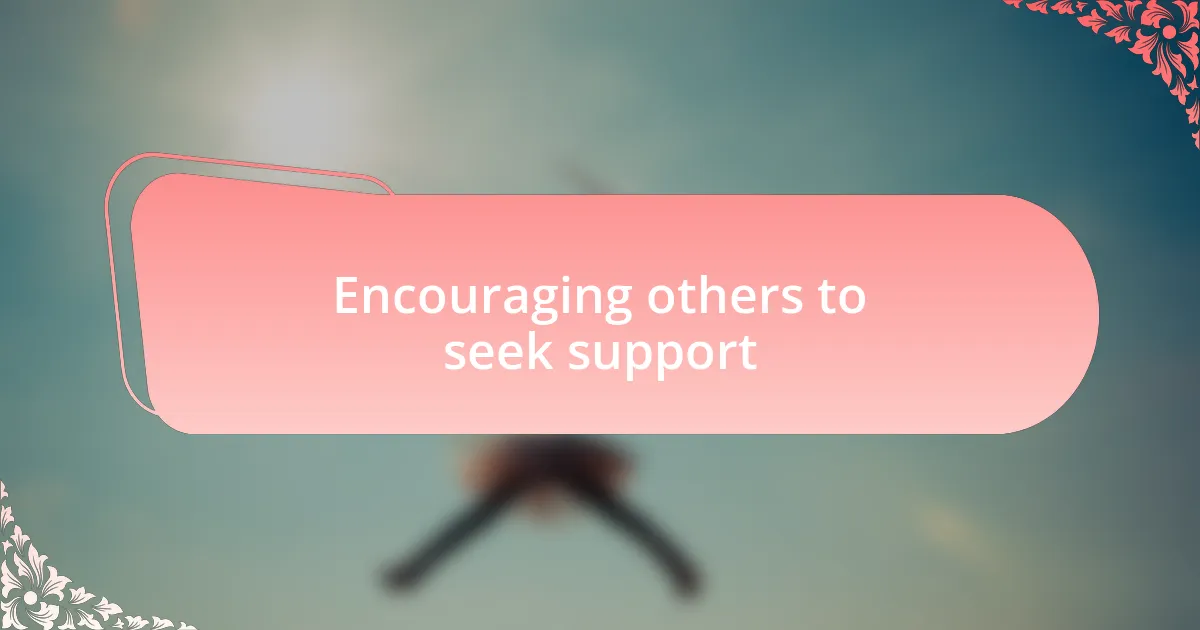Key takeaways:
- Support groups provide emotional connection and shared knowledge, helping parents navigate challenges together.
- Vulnerability fosters bonds, creating a safe space for sharing fears and experiences without judgment.
- Active listening enhances understanding and can transform one’s approach to personal challenges.
- Encouraging others to seek support can be empowering, promoting the idea that reaching out is a strength, not a weakness.

Understanding child health support
When I first encountered the topic of child health support, I found myself overwhelmed by the vast amount of information available. It made me wonder: How do parents navigate this maze of resources? I realized that understanding child health support involves comprehending not just medical advice, but also the emotional and social aspects that play crucial roles in a child’s well-being.
In my experience, connecting with professionals and fellow parents opened my eyes to the multifaceted nature of child health. For example, during a particularly challenging time with my child’s allergies, I found solace in a support group where other parents shared their stories. This exchange not only provided practical tips but also fostered a sense of belonging. Isn’t it amazing how shared experiences can illuminate our paths?
Moreover, child health support isn’t just about addressing immediate issues; it’s about equipping families with the tools needed for long-term wellness. I recall a moment during a workshop where we discussed nutrition, emphasizing how what we feed our children shapes their future health. It struck me—understanding these elements is essential for every caregiver. How can we better equip ourselves and others to face these challenges head-on? Engaging in this conversation is the first step.

Importance of support groups
Support groups serve as vital lifelines, especially in the realm of child health. I vividly remember my first meeting with a group dedicated to special needs children—there was an overwhelming sense of camaraderie that brought tears to my eyes. The shared stories, ranging from triumphs to heartaches, reminded me that I wasn’t alone in my journey. How comforting is that feeling of connection?
What struck me most was the wealth of knowledge exchanged in those settings. One parent, who had successfully navigated the IEP (Individualized Education Program) process, shared resources that transformed my approach. I often think about how that simple act of sharing can empower others—it’s like passing along a map in uncharted territory. Isn’t it incredible how a support group can turn confusion into clarity?
Moreover, the emotional uplift that comes from these gatherings can’t be overstated. At one meeting, we discussed coping strategies during difficult times, and hearing others’ resilience inspired me to face my challenges with renewed hope. Each time I left, I carried not just information, but also a sense of purpose—an alignment of spirit with those around me. This shared emotional journey is what truly underscores the importance of support groups; they don’t just provide answers, they build a community.

Benefits of joining support groups
Joining a support group can profoundly enhance one’s perspective, as I discovered when I attended my first gathering. The diverse experiences shared within the group opened my eyes to new ways of approaching challenges I had thought were insurmountable. It’s extraordinary how hearing someone else’s story can spark a new idea or solution—like finding a fresh pair of glasses to see the world more clearly.
I also found a strong sense of accountability in support groups. During one meeting, a parent shared her goal of attending a therapy session with her child. Her commitment encouraged me to prioritize my own child’s needs in a way I hadn’t considered before. Can you imagine how motivating it is to have a community that gently pushes you to strive for improvement, not just for your child but for yourself as well?
Lastly, there’s an unparalleled comfort in knowing that you’re not facing your struggles alone. One time, amidst heavy discussions, a simple laugh was shared about the quirks of parenting—a moment that lightened the atmosphere instantly. How refreshing it is to realize that, in our toughest times, laughter can still find its way in. That’s the essence of support groups; they blend wisdom, motivation, and companionship, making the journey a little more bearable.

Key takeaways from my journey
One significant takeaway from my journey is the realization that vulnerability breeds connection. I remember one evening when I openly shared my fears about my child’s developmental milestones. The room grew quiet, and then, to my astonishment, several others chimed in with their own worries. It struck me then how our shared vulnerabilities created an immediate bond, a safe space to express our fears without judgment.
Another key insight was the importance of active listening. At one meeting, a fellow parent described her experience navigating school systems. Instead of jumping in with my own story, I chose to simply listen. That decision transformed not just my understanding of her situation, but also how I chose to approach my own challenges. Have you ever noticed how just taking a moment to truly listen can enrich your perspective?
Lastly, I learned that celebrating small victories is crucial. During one gathering, members shared their little wins—whether a successful transition to a new therapy or just another day of resilience. I found myself cheering them on and realized that acknowledging these small moments helped shift my focus from what wasn’t working to what was improving. Isn’t it amazing how these small triumphs can ignite a spark of hope and motivation?

Encouraging others to seek support
When I reflect on my experience, I realize how powerful it can be to gently encourage other parents to seek support. I remember meeting a mother who hesitated to join our group, feeling overwhelmed and unsure. After sharing my own initial fears about reaching out, it felt meaningful to show her that it’s okay to take that first step, and seeing her smile of relief as she finally decided to join was a proud moment for me.
Do you ever feel like you’re alone in your struggles? I used to think that expressing my concerns made me weak, but sharing my story with others opened new pathways. When I encouraged friends to talk about their challenges, I saw the light come back into their eyes—an acknowledgment that they weren’t alone in their journey. It’s fulfilling to witness that transformation; it reminds us all that seeking support is not a sign of defeat, but rather an act of strength.
Encouragement can often be as simple as a heartfelt invitation. When I sat with a fellow parent during a school event, I noticed she seemed isolated. I took a moment to share how the support group had changed my outlook and encouraged her to join. To my surprise, she responded with a mix of gratitude and enthusiasm, proving once again that sometimes all it takes is one person reaching out to uplift another. Have you ever thought about the ripple effects your words can create?